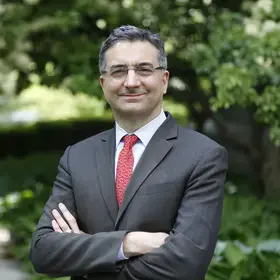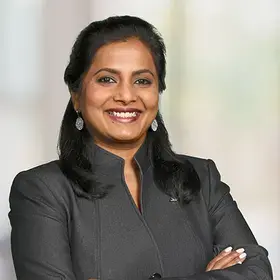This summer, the M.S. in Nonprofit Management program at Columbia University’s School of Professional Studies launched the “Cryptocurrency & Nonprofits: New Frontiers, New Challenges” series. Nonprofit Management Lecturer and U.S. Executive Director of Women for Women International E. Ramone Segree, Ed.D. moderated the first panel on June 30, with Chief Strategy Officer of the Human Rights Foundation Alex Gladstein and Co-Founder and Co-CEO of FreeWill Patrick Schmitt.
The final session, “The Road Ahead,” convened on July 14. Leah Heister Burton, M.S. Nonprofit Management faculty and Deputy Director and Chief Advancement Officer of the Guggenheim Museum, lead the panel with Lisa Zola Greer, philanthropist, entrepreneur, convenor, and author of Philanthropy Revolution, and Mark Ulrich, co-founder and CEO of Every.org joined the webinar as well to share their knowledge as industry leaders.
“As cryptocurrency continues to grow in popularity as a tool for exchange and investment, so too does the opportunity for nonprofits to tap into a new stream of philanthropic income,” said Segree, during the first event in June. “Navigating this new system and maximizing its potential comes with both risk and reward.”
As advances in technology within the nonprofit sector accelerate, organizations are moving towards faster, direct response communications, and online giving has become the norm. Meanwhile, the volume of philanthropic cryptocurrency donations has jumped from $4.2M in 2020 to $69.6M in 2021, a 1,558% increase. Per Pew Research, the market cap for all cryptocurrencies reached $3T in 2021, with $33B venture capital investments in the crypto/blockchain space.
Due to this opportunity, both Gladstein and Schmitt encouraged nonprofit organizations to consider whether their organizations are ready to accept cryptocurrency. For organizations seeking to reform their donation and investment strategies, crypto-philanthropy could be a powerful potential trend to be prepared for and follow.
Gladstein shared his perspectives on Bitcoin, explained how the use of cryptocurrency helps international organizations like the Human Rights Foundation operate, and proposed various ways for nonprofits to receive cryptocurrency gifts.
Nonprofits should begin by cooperating with external financial experts, banks, and companies to manage the crypto-donations, explained Gladstein. Nonprofits can also hold the crypto-assets internally and may consider the assistance of a “collaborative custody” firm as a security solution that provides organizations with greater transparency and security when accepting Bitcoin donations. He emphasized that accepting crypto-philanthropy will not automatically lead to a great number of donations–a sound fundraising strategy is very much still needed in any nonprofit organization.
Schmitt advised that maximizing the potential of cryptocurrency in the nonprofit sector comes with both risk and reward and also introduced the advantages and disadvantages of cryptocurrency.
Cryptocurrency is owned by more than 50% of millionaires across multiple industries, according to Schmitt. To process cryptocurrency donations, nonprofits need to first understand how to create a wallet and manage it, he explained. The majority of donors, however, are not invested in cryptocurrency are unaware that they can engage in philanthropy through crypto, and do not understand that crypto-philanthropy may present tax benefits, Schmitt said.
Nonprofit fundraisers should gain more insights into donors and maintain positive relationships with them to enable the possibility of accepting potential cryptocurrency donations should these habits change, Schmitt added.
Gladstein and Schmitt answered questions from attendees. Additional resources and a recording of the session will be posted to the Session 1 event page.
The second event in the series, “Organizational Considerations,” took place on July 7. The discussion was led by John Hicks, M.S. Nonprofit Management lecturer and Principal and Chief Strategist of DLBHICKS, LLC. Karen Gano, Esq., M.S. Nonprofit Management faculty and Principle of Gano Nonprofit Services, LLC, and Diane Clifford, Managing Director of Constituent Development and Operations of Share Our Strength-No Kid Hungry, provided their insights on cryptocurrency in the nonprofit sector. .
Learn more about the Cryptocurrency & Nonprofits: New Frontiers, New Challenges series and join the final session this month.


